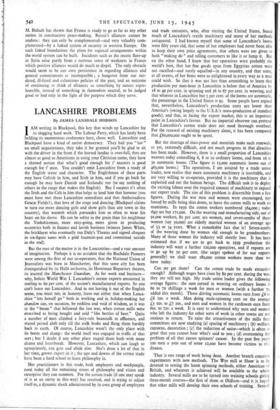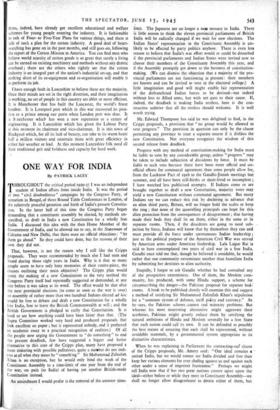LANCASHIRE PROBLEMS
By JAMES LANSDALE HODSON
TAM writing in Blackpool, this key that winds up Lancashire for 1. its slogging hard work. The Labour Party, which has lately been holding its momentous conference here, chose well. Lancashire and Blackpool have a kind of native democracy. They hail you " luv " on small acquaintance, they take it for granted you'll be glad to sit with the driver in the front if the horsed landau is over-full, they are almost as good as Americans in using your Christian name, they have a shrewd notion that what's good enough for t' masters is good enough for t' men. You couldn't omit Lancashire from a study of the English scene and character. The Englishman of these parts may have Celtish in him, and Irish in him, and if you go back far enough he may have Danish and Icelandic too (to say nothing of others in the range that makes the English). But I suspect it's often the Irish and the Celt in him that helps to lend him that humour (you must have met these Lancashire comedians and that Ambassadress Gracie Fields?), that love of the stage and dancing (Blackpool claims to turn out more dancing girls and show girls than any town in the country), that warmth which persuades him so often to wear his heart on his sleeve. He can be softer in the grain than his neighbour the Yorkshireman, more easy-going, more given to producing eccentrics both in finance and lavish business (witness James White, the bricklayer who eventually ran Daly's Theatre and signed cheques in six-figure sums with a gold fountain-pen and committed suicide in the end).
But the root of the matter is in the Lancastrian—and a vast amount of imagination. Perhaps it is no accident that the Rochdale Pioneers were among the first of our co-operators, that the National Union of Journalists was born in Manchester, that this same city has been distinguished by its Halle orchestra, its Horniman Repertory theatre, its journal the Manchester Guardian. As for work and business— why, before World War I. Lancashire's cotton exports amounted in stealing to 6o per cent. of the nation's manufactured exports. So you can't leave out Lancashire. And in not leaving it out of the English scene, you must not, in honesty, leave out either that when Lanca- shire "lets herself go" both in working and in holiday-making her abandon can, on occasion, be reckless and void of wisdom, as it was in the " boom " that followed the last war, when cotton mills were described as being bought and sold "like bottles of beer." Quite a number of men climbed a fairy-tale beanstalk to affluence, and stayed poised aloft only till the stalk broke and flung them harshly back to earth. Of course, Lancashire wasn't the only place with its boom and slump: the world itself was engaged in traffic of that sort ; but I doubt if any other place staged them both with more drama and heartbreak. However, Lancashire, which can laugh so uproariously, can grin and abide also. She's done a lot of that in her time, grown expert in it ; the ups and downs of the cotton trade have been a hard school to learn philosophy in.
Her practitioners in this trade, both employers and workpeople, need today all the remaining stores of philosophy and vision and enterprise they can summon. For the cotton, trade (if one may speak of it as an entity in this way) has received, and is trying to adjust itself to, a dynamic shock administered by its own group of employers and trade unionists, who, after visiting the United States, found much of Lancashire's textile machinery and many of her methods antiquated. I had known myself that some of Lancashire's looms were fifty years old, that some of her employers had never been able to keep their own price agreements, that others were too given to both "making do" and telling customers to like it or lump it. But on the other hand, I knew that her operatives were probably the world's best, that her fine goods spun from Egyptian cotton were not excelled—and rarely equalled—in any country, and that some, at all events, of her firms were as enlightened in every way as a man could wish. So that it was not less than astonishing to learn that production per man-hour in Lancashire is below that of America by 18 to 49 per cent, in spinning and 56 to 67 per cent, in weaving, and that whereas in Lancashire but 5 per cent. of the looms are automatic, the percentage in the United States is 95. Some people have argued that, nevertheless, Lancashire's production costs are lower than America's (owing largely to the U.S.A.'s mass-production of standard goods), and that, in facing the export market, this is an important point in Lancashire's favour. But no impartial observer can pretend that Lancashire's cotton trade does not need thorough overhaul. For the renewal of existing machinery alone, it has been computed that £6o,00o,000 ought to be spent.
But the shortage of man-power and materials make such renewals, as yet, extremely difficult, and not much progress in that direction has been made. However, there is a small proportion of Lancashire weavers today controlling 6, 8 or to ordinary looms, and -from 16 tc 30 automatic looms. (The figure is 15,000 automatic looms out of 463,000 looms.) The operatives, I am asiured by a trade union leader, now realise that more automatic machinery is inevitable, and are very willing to co-operate, provided it is the machinery that is exploited and not the human beings. The difficult task is to deploy the existing labour over the required amount of machinery to expand our export trade. The size of this problem is discernible from a few figures. During the war men and women were encouraged, nay forced by mills being shut down, to leave the cotton mills to work on munitions. In 1939 the cotton workers numbered 364,000 ; today they are but 171,000. On the weaving and manufacturing side, out of 91,000 workers, 8o per cent. are women, and seven-tenths of those women (say 5o,000) are elderly married women of an average age of 53 or 54 years. What a remarkable fact that is! Seven-tenths of the weaving done by women old enough to be grandmothers. Many of those women the industry will shortly lose. It has been estimated that if we are to get back to 1939 production the industry will want a further 12o,000 operatives, and if exports are to go up by 50 per cent. (the target spoken of for our exports generally) we shall want 18o,000 cotton workers more than we have today.
Can we get them? Can the cotton trade be made attractive enough? Although wages have risen by 8o per cent. during the war, they are still not high. My trade union leader gives the following average figures : the sum earned in weaving on ordinary looms is 6o to 70 shillings a week for men or women (with a further 75. added this month). Those driving automatic looms earn from £6 w
ios. a week. Men doing mule-spinning earn on the average £5 Jos. to 4.7 los., and men and women in the cardroom earn from 6os. to 72s. a week. It is easy to understand why men and women who left the industry for other sorts of work in other towns are not anxious to return. To raise the attractiveness of the mills four committees are now studying (a) spacing of machinery ; (b) welfare, canteens, decoration ; (c) the reduction of noise—which is often co great that you cannot hear what's said to you ; (d) overcoming the problem of oil that causes spinners' cancel-. In the past five year, 500 men a year out of some 12,000 have become victims to th.- disease.
That is one range of work being done. Another branch concerns experiments with new methods. The Wye mill at Shaw is to be devoted to testing the latest spinning methods, either American or British, and whatever is achieved will be available to the whole industry. Several mills are to be turned into training schools giving three-month courses—the first of them at Oldham—and it is hoped that other mills will develop their own schools of training. Several firms, indeed, have already got excellent educational and welfare schemes for young people entering the industry. It is fashionable to talk of Four- or Five-Year Plans for various things, and there is talk of such a plan for the cotton industry. A good deal of heart- searching has gone on in the past months, and still goes on, following the report of the Cotton Mission to America. You can find men who believe world scarcity of cotton goods is so great that surely a living can be earned on existing machinery and methods without any drastic overhaul ; there are the others who rightly see that the cotton industry is an integral part of the nation's industrial set-up, and that nothing short of its re-equipment and re-organisation will enable it to perform its job.
I have enough faith in Lancashire to believe these are the majority. Once their minds are set in the right direction, and their imagination is working, no set of people in this country are abler or more efficient. It is Manchester that has built the Lancaster, the world's finest bomber. It is Liverpool port which in this war recovered its posi- lien as a prince among our ports when London port was shut. It is N anchester which has won a new reputation as a centre of engineering. . It is Lancashire which has given the Labour Party• at this moment its chairman and vice-chairman. It is this town of Blackpool which, for all its lack of beauty, can take to its warm heart half a million visitors and entertain them with great efficiency in either fair weather or foul. At this moment Lancashire folk need all their traditional grit and boldness and capacity for hard work.



























 Previous page
Previous page